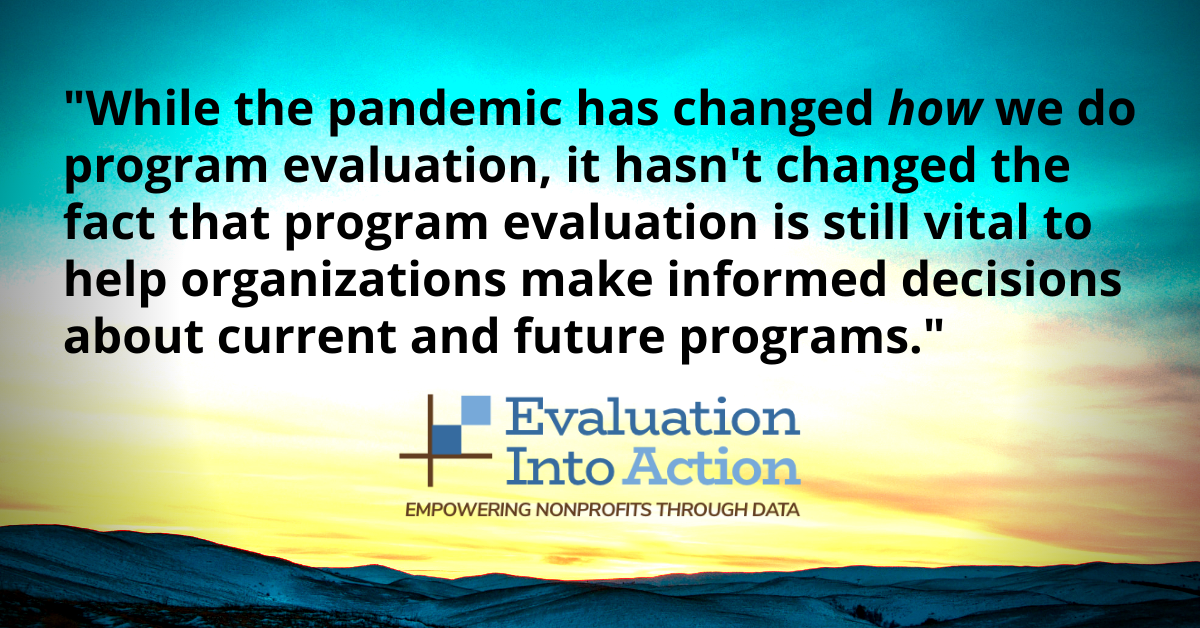May 15th, 2020

Since the global coronavirus pandemic turned the world upside down, I can’t help but wonder about how all of this will impact current and future program evaluation work.
Here are just a few of the questions I have heard from my clients, colleagues, nonprofits, foundations, and the evaluation sector at large:
While I certainly don’t have all the answers to these questions, here’s what I do know:
My current work with Metro, the regional government agency for the greater Portland, Oregon area, is an example of how to move forward with program evaluation during these unusual times. The project is to evaluate Metro’s Investment and Innovation Program. This three-year pilot grant program is designed to reduce waste in the Portland Metro Area through nonprofit and business grants.
Instead of letting the pandemic halt progress, we have quickly adapted how we worked together.
Instead of in-person working sessions and my trusty box of meeting facilitation tools (my go-tos include flip charts, markers, and hands on mini-activities!), we quickly shifted to online meetings and email.
Here are just a few things we’ve found that work well:
All our meetings have strong, clear agendas. We use video calls to maintain a more personal working environment. We are meeting more frequently now than before, which helps us all stay on the same page. We stick to our meeting start and end times, which means we stay on task, productive, and focused. We include some “check in” time at the beginning of each meeting so we can share any personal updates and stay connected on a social level. When looking at materials, one person shares their screen so we’re all looking at the same thing at the same time (instead of each of us opening our own document on our computers). There’s always a designated note taker, who captures ideas in real-time, so the meeting feels dynamic.
While of course I miss being able to connect and collaborate in person, the team is embracing the changes and keeping the work moving forward.
Because we all have a shared willingness to embrace a new virtual style of working together, I’m confident we’ll all find answers to all of the functional questions we have about our evaluation plan in the coming weeks.
There is no “one size fits all” answer to how best to continue doing evaluation work in these uncertain times – but it’s clear that without creativity, flexibility, and courage, discovering solutions for these difficult questions would be impossible.
Here’s the big takeaway: while the pandemic has changed how we do program evaluation, it doesn’t change the fact that program evaluation is still important for organizations to make informed decisions about current and future programs.
Organizations owe it not only to current program participants (or grantees, in Metro’s case!), but also to future program participants to always remain dedicated and focused on continual program improvements.
Before I go, remember these 3 things:
A special thank you to the Metro Investment and Innovation team Suzanne Piluso and Laura van der Veer for your commitment to measuring program impact. Your dedication to collecting and using data to understand your program’s successes, challenges, and opportunities is powerful. I’m proud to work alongside of you to learn all we can about how the program has been working and to give you the tools to keep growing and improving!
To all those organizations and my fellow evaluators who remain committed to data driven decision making through these trying times… keep up the great work! We’ve got this!
Resources I’ve found especially helpful lately:
Chari accurately captured the fundamental goals and mission of our organization and transformed our input into a clear evaluation process that helps us assess the impact of our programs on the lives of the families that we serve. Now we have an amazing way to measure the physical, emotional, and mental effects of our programs and to guide change, ensuring that we are delivering services in the most effective way possible.
Brandi Tuck, Executive Director, Portland Homeless Family Solutions
Get periodic emails with useful evaluation resources and industry updates.
We promise not to spam you!